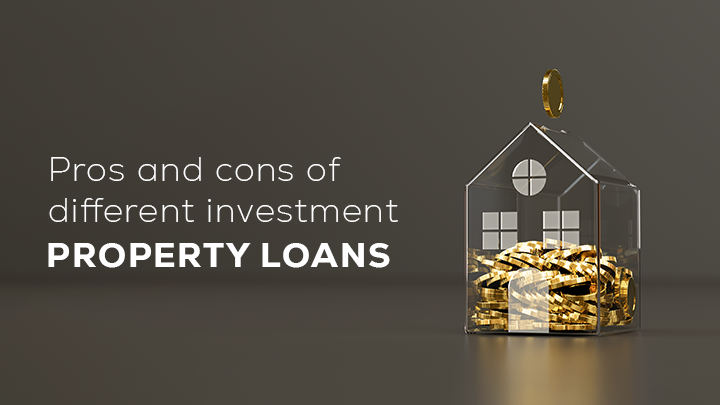Navigating the Benefits and Drawbacks of Different Investment Property Loans
-

- by Indian Estate Group,
- October 27, 2023
- in Property Management

In 2023, residential property transactions worldwide are projected to reach an impressive $7.7 trillion, as reported by Statista. With an increasing number of individuals aiming to seize opportunities in this flourishing market, investment property loans have emerged as indispensable tools for turning real estate aspirations into reality. These financial instruments offer aspiring property investors the means to secure the necessary funds for purchasing residential, commercial, or mixed-use properties. However, investment property loans aren't simple. In fact, actually deciding on the option can be just as difficult, as discovering the property.
Within this guide we will thoroughly examine these loans examining their advantages and disadvantages. Whether you're a seasoned investor or new to real estate, we aim to provide useful insights for smart financial choices in property investment. So, let's get started and learn about the opportunities and challenges of investment property loans.
The Many Faces of Property Loans
There are several kinds of property loans available in the market to carry forward real estate investments. Some serve primary needs while others cater to secondary requirements and come with their own set of pros and cons. Here are some of the most popular investment property loans found today and what they have to offer.
1. Traditional Property Loans
Pros:
Lower Interest Rates: Traditional property loans often come with lower interest rates compared to other types of loans.
Longer Repayment Terms: You usually have more time to repay the loan, making it manageable.
Suitable for All Property Types: Traditional loans work for residential, commercial, or mixed-use properties.
Cons:
Stringent Approval Requirements: Getting approved can be challenging, as lenders typically require a good credit score and a substantial down payment.
Slow Approval Process: The application and approval process may be lengthy, which can delay your property purchase.
2. Commercial Property Loans
Pros:
Ideal for Business Investments: These loans are designed for purchasing properties that will be used for business purposes.
Higher Loan Amounts: You can often secure larger loan amounts, making it suitable for substantial commercial investments.
Interest Tax Deductions: The interest that you pay on the commercial property loan is usually tax-deductible.
Cons:
Tough Qualification Procedures: Lenders may have tighter qualification guidelines and the terms can be of lesser favorable conditions if you fall short of those criteria.
Higher Interest Rates: Commercial property loans normally attract higher interest rates compared to traditional residential loans.
3. Property Mortgage Loans
Pros:
Low-Interest Rates: Mortgage loans generally offer competitive interest rates, especially if you have a good credit score.
Long Repayment Terms: You can often choose between various term lengths, providing flexibility.
Fixed or Variable Rates: Several fixed-rate and variable-rate mortgages are available to you, based on your level of risk tolerance.
Cons:
Down Payment Required: You will generally have to put forward a down payment. The amount of the down payment varies depending on the loan type and lender.
Risk of Property Foreclosure: The failure for making the repayment of mortgage could lead foreclosure towards your property by the lender.
Making an Informed Choice
When deciding on the most suitable investment property loan, it's essential to take into account your financial circumstances, investment objectives, and comfort level with risk. Let’s go through some critical aspects that one should remember:
-
Interest Rates: It's worth comparing interest rates from lenders as lower rates can result in long term savings.
-
Loan Amount: Make sure the loan amount aligns with the propertys cost and fits within your budget. Avoid overextending yourself
-
Repayment Terms: Longer repayment terms can reduce your monthly payments, but you may pay more in interest over this long period.
-
Eligibility and Documentation: Familiarize yourself with the lenders requirements. Always ensure that you have all the documents ready beforehand.
-
Property Type: Choose a loan that matches the type of property you intend to invest in.
-
Risk Assessment: Consider your risk tolerance and ability to handle the responsibilities of the loan.
-
Tax Implications: Understand how the loan's interest and other aspects will impact your tax liability.
Real-Life Example
Now, let's take a practical example to illustrate how these decisions work. Picture yourself with plans to invest in a property to launch a restaurant. In this situation, selecting a property loan could be the right decision, considering the specific needs of your business. Although this type of loan might come with interest rates the potential, for generating business revenue could help compensate for this expense.
On the hand if you're purchasing a property, for long term investment purposes a conventional property loan might be more appropriate. The lower interest rates and extended repayment terms make it a viable option.
The Final Word
Investment property loans offer opportunities for wealth building but come with their own set of advantages and disadvantages. Careful consideration of your goals and financial situation is crucial when choosing the right loan type. Don't forget to shop around, compare offers, and consult with financial experts or loan advisors if needed. By making an informed decision, you can unlock the potential of real estate investments and achieve your financial objectives.
3 Comments:
Jhon doe
Mei 13, 2020- 3/5
Cras sit amet nibh libero, in gravida nulla. Nulla vel metus scelerisque ante sollicitudin. Cras purus odio, vestibulum in vulputate at, tempus viverra turpis. Fusce condimentum nunc ac nisi vulputate fringilla. Donec lacinia congue felis in faucibus.
Jhon Doe
Mei 13, 2020- 5/5
Cras sit amet nibh libero, in gravida nulla. Nulla vel metus scelerisque ante sollicitudin. Cras purus odio, vestibulum in vulputate at, tempus viverra turpis. Fusce condimentum nunc ac nisi vulputate fringilla. Donec lacinia congue felis in faucibus.
Your rating for this listing:
- 3/5